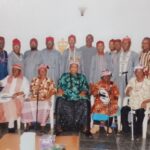The scourge of harmful widowhood practices in Igboland has persisted for far too long, leaving a trail of trauma, pain, and injustice in its wake. These practices, often rooted in outdated cultural norms, have no place in modern society.
Under these practices,which are legacies of oppression, widows in Igboland are subjected to inhumane treatment – including forced hair shaving, drinking water used to bathe their husband’s corpse, and denial of inheritance rights. These practices are a stark reminder of the patriarchal society that perpetuates them.
The situation is even more worrisome because it is often the women themselves – specifically the Umuadas, who enforce these harmful practices. This highlights the need for women to be at the forefront of challenging and changing these norms.
Again,harmful widowhood practices are a clear violation of human rights, dignity, and freedom. They must be condemned and eradicated. It sounds atavistic that in the 21st century, some communities in Igboland are still reported to be indulging in these obnoxious and anti-human practices.
These practices leave nothing good than a devastating impact on women and children, perpetuating cycles of poverty, trauma, and marginalization.This is very unfortunate.
As a way out of these anti-human doctrines, the government must enact and enforce laws that protect widows’ rights and punish perpetrators of these harmful practices. Women should also be sensitized and educated on their rights through mounting education and awareness campaigns for them. Such can help change their attitude and behaviours, as well as promote a culture of respect and empathy for the widows.
Furthermore,our traditional rulers and community leaders must equally play a crucial role in promoting positive change and condemning harmful practices. All these obnoxious practices against women happen in the commmunities – so,no traditional ruler or community leader can feign ignorance of them except, of course, they are part of the perpetrators.
Nigerian Horn is of the view that the task of eradicating harmful widowhood practices in Igboland is a collective responsibility. Putting an end to it once and for all requires a collective effort from individuals, communities, governments, and organizations.
It is possible that by working together, a brighter future can be created for widows in Igboland, one that is marked by dignity, respect, and justice. Injustice to humanity in any form, no matter the gender involved, is injustice to all – for “the eyes and the nose are one; when one is hurt, the other shades water.”

Hi, Im Celinne
WordPress offers you the ability to create a custom URL structure for your permalinks and archives.





